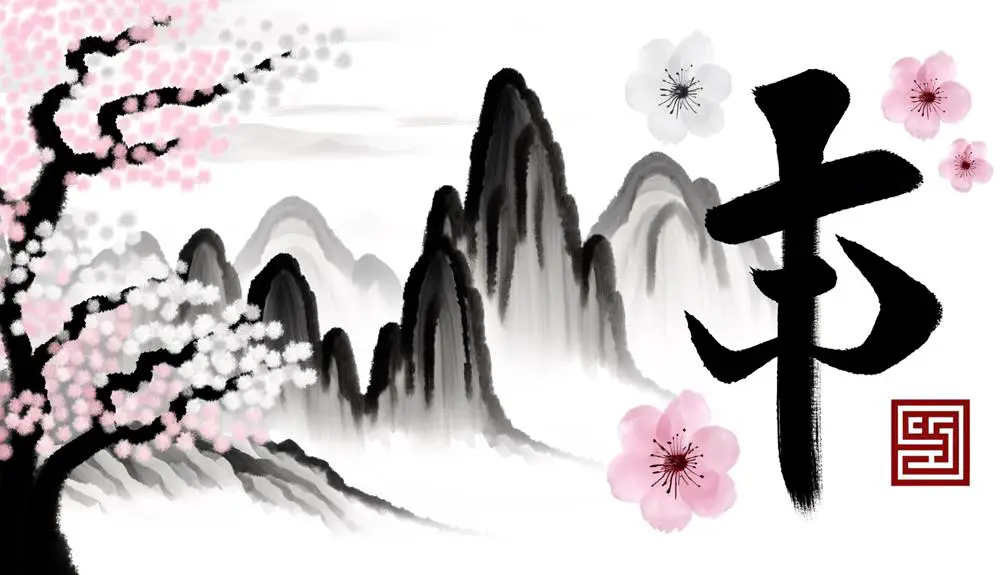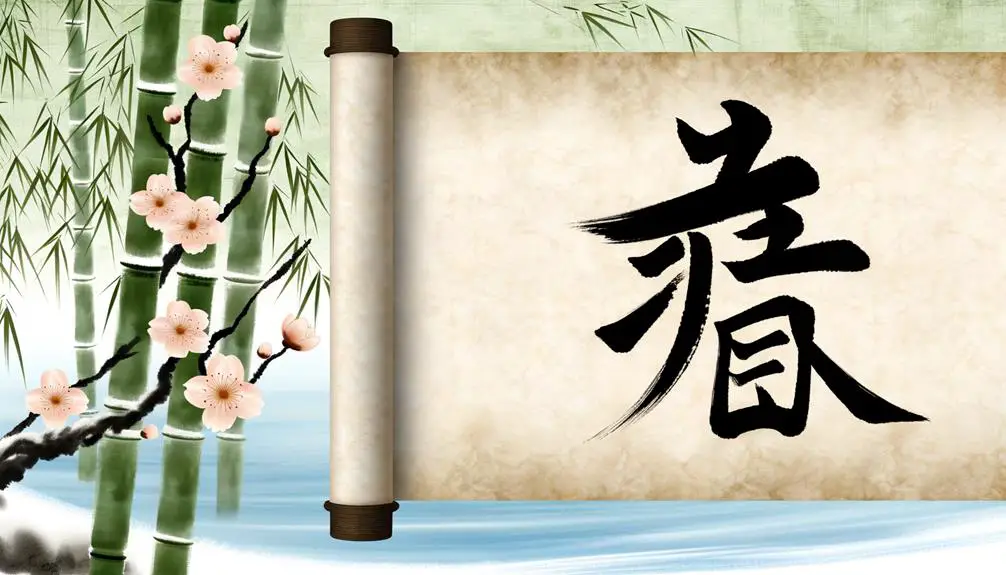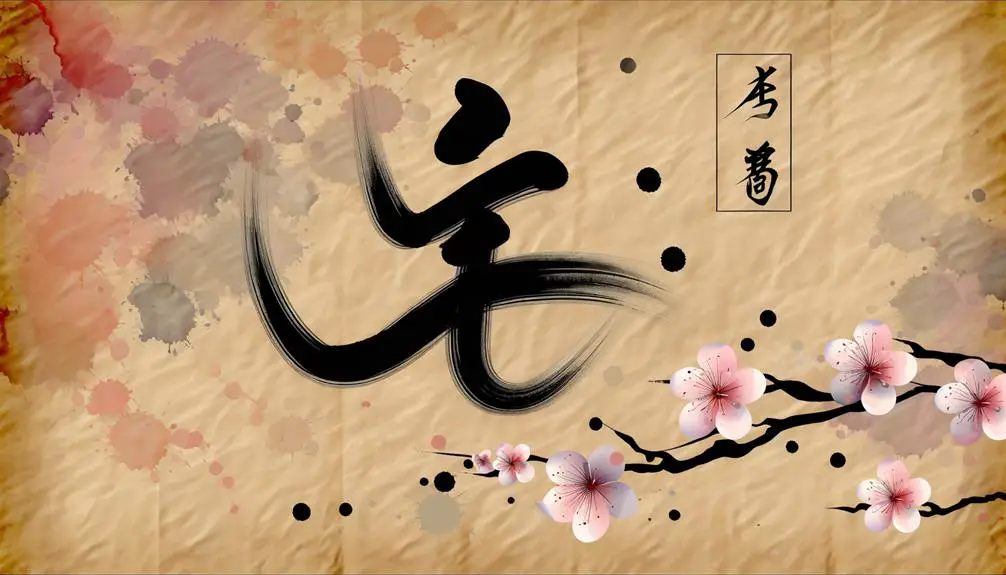How to Write the Chinese Symbol for ‘I Miss You’: A Step-by-Step Guide
The Chinese phrase for "I miss you" is written as 我想你 (wǒ xiǎng nǐ). In this expression, "我" (wǒ) means "I," "想" (xiǎng) translates to "to think" or "to ponder" with an emotional nuance, and "你" (nǐ) means "you." The combination of these characters conveys a deep sense of longing and affection.
Proper pronunciation using tonal accuracy is essential to express the correct emotion, as Mandarin Chinese relies heavily on tones. For those interested in the intricacies of Mandarin tones, character composition, and cultural significance, further insight awaits.

Key Takeaways
- The Chinese phrase for 'I miss you' is composed of the characters 我 (Wǒ), 想 (Xiǎng), and 你 (Nǐ).
- 我 (Wǒ) means 'I' or 'me' in Mandarin Chinese.
- 想 (Xiǎng) translates to 'to think' or 'to miss' in Mandarin Chinese.
- 你 (Nǐ) signifies 'you' in Mandarin Chinese.
- Accurate pronunciation of tones is crucial for conveying 'I miss you' in Mandarin effectively.
Meaning of 'Wǒ'

The character 'Wǒ' (我) in Mandarin Chinese translates to 'I' or 'me' and is fundamental in expressing personal emotions, including the sentiment of missing someone. This character is a cornerstone in Mandarin, frequently used in daily communication. It is pivotal in constructing sentences that reflect personal feelings and states of mind.
In the context of expressing longing or affection, 'Wǒ' is integral, serving as the subject that conveys the speaker's emotions. Understanding 'Wǒ' is essential for comprehending the nuances of Mandarin, as it encapsulates the self's position in various emotional expressions. Its usage is pervasive and necessary for anyone seeking proficiency in the language, especially in emotionally charged contexts.
Meaning of 'Xiǎng'
The term 'Xiǎng' (想) in Mandarin Chinese carries multifaceted significance, encompassing both the literal translation of 'to think' or 'to ponder' and the deeper emotional resonance of longing or missing someone.
Understanding its cultural context is essential, as it reflects how emotional expression is intricately woven into linguistic structures.
Literal Translation Breakdown
Delving into the literal translation of the Chinese character '想' (xiǎng), it embodies the concept of thinking, longing, or missing. This versatile character is deeply rooted in the Chinese language and culture, invoking a sense of emotional depth and intellectual engagement.
Key aspects of '想' include:
- Thinking: Reflects a cognitive process, indicating contemplation or consideration.
- Longing: Conveys a yearning sensation, often associated with emotional distance and desire.
- Missing: Represents the state of absence and the emotional response to it.
- Imagining: Suggests a creative or speculative thought process, extending beyond immediate reality.
Understanding '想' provides a nuanced comprehension of how this character encapsulates intricate emotional and cognitive states, essential for grasping its use in expressing 'I miss you.'
Cultural Context Importance
Exploring the cultural context of '想' (xiǎng) reveals its profound significance in Chinese expressions of emotion and thought. Rooted in traditional Chinese philosophy, '想' embodies a deep reflective process, often associated with longing and contemplation.
In various contexts, 'xiǎng' can mean 'to think', 'to miss', or 'to wish', each nuance reflecting different aspects of emotional and cognitive engagement. This multiplicity underscores the complexity of human emotions in Chinese culture, where the same character encapsulates a range of feelings from intellectual consideration to heartfelt yearning.
Understanding 'xiǎng' necessitates an appreciation of its cultural resonance, where thought and emotion are intertwined, portraying a holistic view of human experience in Chinese linguistic tradition.
Emotional Expression Nuances
In the domain of emotional expression, 'xiǎng' ('想') encapsulates a spectrum of sentiments, from wistful nostalgia to deep intellectual contemplation. This multifaceted term integrates both affective and cognitive dimensions, enriching the emotional tapestry of Chinese linguistic culture.
When someone says 'wǒ xiǎng nǐ' (我想你), it conveys more than just missing someone; it implies a profound mental engagement and yearning.
- Nostalgia: Reflects on past experiences and memories, evoking a longing for what once was.
- Contemplation: Suggests deep, thoughtful consideration, often of a person or situation.
- Desire: Embodies a heartfelt wish or want, extending beyond mere absence.
- Connection: Implies an enduring bond that persists irrespective of physical distance.
This complexity underscores the richness of 'xiǎng' in expressing nuanced emotional states.
Meaning of 'Nǐ'

The character '你' (nǐ) forms an essential part of the phrase '我想你' (wǒ xiǎng nǐ), meaning 'I miss you'.
Understanding its origins, correct pronunciation with the third tone, and its significance in Chinese culture provides deeper insight into its usage.
This exploration encompasses the historical development of the character, its phonetic articulation, and its role in expressing personal emotions.
Character Origins Explained
Understanding the character '你' (Nǐ) is essential for grasping its meaning and cultural significance in Mandarin Chinese. This character, commonly translating to 'you,' carries profound historical and linguistic roots. Its origins can be traced back to ancient Chinese script, evolving over millennia to its current form.
- Radical Component: The left side of 你 contains the '亻' radical, symbolizing a person or human-related concepts.
- Phonetic Component: The right side, '尔' (ěr), contributes to the character's pronunciation.
- Cultural Context: Used ubiquitously in daily interactions, '你' signifies respect and familiarity.
- Evolution: From oracle bone inscriptions to modern simplified script, its structure has adapted for ease of writing.
Understanding these elements enriches one's comprehension of Mandarin and its intricate character system.
Pronunciation and Tone
Mastering the pronunciation and tone of 'Nǐ' is important for accurate communication in Mandarin Chinese.
The character '你' (nǐ) is pronounced with a third tone, which is a falling-rising tone. This tone starts mid, dips down, and then rises again, making it distinct from other tones.
Accurate tone usage is essential, as Mandarin is a tonal language where meaning changes with tone variation.
For 'nǐ', the correct pronunciation guarantees clarity in expressing the sentiment 'I miss you' (我想你, wǒ xiǎng nǐ).
Mispronunciation can lead to misunderstandings or entirely different meanings.
Therefore, practicing the third tone's nuanced modulation is important for conveying heartfelt emotions precisely in Mandarin.
Cultural Significance
Beyond pronunciation, '你' (nǐ) holds deep cultural significance, representing a direct and personal form of address in Mandarin that reinforces interpersonal connection and intimacy. In Chinese culture, the use of '你' conveys respect and emotional closeness, making it integral in expressing sentiments such as 'I miss you.' The character reflects not just linguistic functionality but also cultural values embedded in daily interactions.
- Personalization: '你' (nǐ) emphasizes individual acknowledgment and personal connection.
- Respect: Despite its informality, it maintains a tone of respect and consideration.
- Emotional Depth: Utilized in expressions of affection and longing, enhancing emotional resonance.
- Cultural Norms: Its usage aligns with societal norms that prioritize harmonious relationships and mutual recognition.
This multifaceted significance underpins '你' in Mandarin communication.
Character Composition
The Chinese phrase for 'I miss you' is composed of characters that each carry specific meanings and cultural significance. The phrase typically uses three characters: 我 (wǒ), 想 (xiǎng), and 你 (nǐ). '我' translates to 'I' or 'me', denoting the subject. '想' conveys multiple layers of meaning, including 'to think', 'to consider', and 'to miss', reflecting the emotional depth of the sentiment. '你' translates to 'you', indicating the object of affection.
| Character | Meaning |
|---|---|
| 我 | I / Me |
| 想 | To think / Miss |
| 你 | You |
Each character contributes to a phrase that not only communicates longing but also encapsulates cultural nuances of emotional expression.
Pronunciation Guide

Understanding the pronunciation of the Chinese phrase for 'I miss you' requires familiarity with Mandarin pronunciation basics and the tonal nature of the language.
Each tone in Mandarin can alter the meaning of the words, making accurate pronunciation essential.
Consistent practice will help in mastering the nuances and ensuring effective communication.
Mandarin Pronunciation Basics
To properly pronounce Mandarin words, it is essential to understand the four tones that define the language's meaning and structure. Mandarin, a tonal language, relies heavily on pitch variation to convey different meanings for the same syllable. Mastery of pronunciation involves recognizing these tonal differences and applying them correctly.
Here are some fundamental aspects to take into account:
- Pinyin System: A romanization system used to transcribe Mandarin sounds into the Latin alphabet.
- Initials and Finals: Basic phonetic components that form syllables in Mandarin.
- Tone Marks: Diacritical marks indicating the pitch contour of a syllable.
- Neutral Tone: A light, unstressed tone that often alters the meaning subtly.
Understanding these basics lays the groundwork for accurate and meaningful communication in Mandarin.
Tones and Meaning
Building on the basics of Mandarin pronunciation, tones greatly influence the meaning of words and phrases in this tonal language. Mandarin Chinese utilizes four primary tones: high level, rising, falling-rising, and falling. Each tone can completely alter the intended meaning of a word, requiring precise pronunciation.
For the phrase 'I miss you,' which translates to '我想你' (wǒ xiǎng nǐ), mastering the tones is vital. '我' (wǒ) uses the third tone, '想' (xiǎng) employs the third tone, and '你' (nǐ) also takes the third tone. Correctly articulating these tones guarantees the expression is understood as intended.
Mispronunciation can lead to misunderstandings, highlighting the significance of tone accuracy in conveying the heartfelt sentiment accurately.
Practice Makes Perfect
Mastering the pronunciation of Mandarin Chinese, especially for emotionally significant phrases like 'I miss you,' necessitates diligent practice and an understanding of tonal subtleties. The phrase '我想你' (wǒ xiǎng nǐ) demands careful attention to tonal accuracy to convey the intended emotion correctly. Mispronunciation can lead to misunderstandings or entirely different meanings.
To achieve proficiency, consider the following:
- Tonal Practice: Focus on mastering the four tones of Mandarin. Each tone alters the meaning of words.
- Audio Resources: Use language apps or online platforms with native speaker audio for precise pronunciation.
- Language Exchange: Engage with native speakers through language exchange programs to refine your skills.
- Consistent Repetition: Regularly practice speaking and listening to Mandarin to build muscle memory and auditory recognition.
This methodical approach guarantees a deeper, more nuanced understanding of the language.
Historical Origins
The historical origins of the Chinese symbol for 'I miss you' are deeply entwined with the cultural and linguistic evolution of Chinese script over millennia.
The phrase '我想你' (wǒ xiǎng nǐ) combines '我' (wǒ, meaning 'I'), '想' (xiǎng, meaning 'miss' or 'think'), and '你' (nǐ, meaning 'you').
The character '想' evolved from ancient scripts such as Oracle Bone Script and Seal Script, reflecting the deep-rooted importance of emotional expression in Chinese culture.
As Chinese civilization progressed, these characters were standardized during the Qin Dynasty and later refined in subsequent dynasties.
Understanding this historical backdrop highlights the enduring significance of affection and longing in Chinese communication, illustrating the timeless nature of human emotions conveyed through script.
Emotional Context

Expressing longing through the phrase '我想你' (wǒ xiǎng nǐ) taps into the profound emotional reservoir embedded in Chinese culture, encapsulating feelings of nostalgia, affection, and yearning.
This phrase is not merely a linguistic expression but a deep-rooted cultural sentiment that resonates with the human experience of separation and desire for connection. The emotional context of '我想你' is nuanced, reflecting a rich tapestry of interpersonal relationships and heartfelt expressions.
- Nostalgia: Evokes memories of past moments and shared experiences.
- Affection: Conveys deep care and emotional attachment.
- Yearning: Signifies a strong desire to reunite and bridge the distance.
- Cultural resonance: Embodies traditional values of familial bonds and personal connections.
Understanding this phrase requires appreciating its layered emotional significance.
Usage in Daily Life
In daily life, the phrase '我想你' (wǒ xiǎng nǐ) is commonly used to convey personal emotions of missing someone, whether in casual conversations, written communication, or digital interactions.
This expression is prevalent among friends, family members, and romantic partners. In text messaging and social media, the phrase is often abbreviated to '想你' (xiǎng nǐ) for brevity.
Utilizing this phrase in phone calls or face-to-face interactions adds a layer of emotional depth, demonstrating a genuine sense of longing and affection. The cultural context emphasizes the importance of maintaining close relationships, and this phrase facilitates emotional expression.
Understanding its use is essential for effective communication and emotional connection in Chinese-speaking environments.
Variations and Synonyms

Variations and synonyms of the phrase '我想你' (wǒ xiǎng nǐ) enrich the emotional lexicon, allowing for nuanced expressions of longing and affection in the Chinese language. These linguistic variations reflect cultural subtleties and the depth of interpersonal connections.
- 我思念你 (wǒ sīniàn nǐ): Emphasizes a deeper, almost nostalgic yearning.
- 我挂念你 (wǒ guàniàn nǐ): Conveys a sense of worry or concern in the act of missing someone.
- 我想念你 (wǒ xiǎngniàn nǐ): Similar to '我想你,' but slightly more formal and literary.
- 我怀念你 (wǒ huáiniàn nǐ): Often used to express fond memories and a sense of cherishing past moments.
These variations provide speakers with a rich array of choices to convey their sentiments accurately.
Cultural Significance
Understanding the variations of the phrase '我想你' (wǒ xiǎng nǐ) reveals its profound cultural significance, illustrating how expressions of longing are interwoven with the fabric of Chinese interpersonal relationships. In Chinese culture, verbalizing 'I miss you' is not merely an expression but a reflection of deep emotional connections, often reserved for close family, friends, or romantic partners. The phrase encompasses a sense of nostalgia and emotional bond that signifies the importance of the relationship.
| Phrase | Pinyin | Contextual Meaning |
|---|---|---|
| 我想你 | wǒ xiǎng nǐ | I miss you (general) |
| 想念你 | xiǎngniàn nǐ | I miss you (nostalgic) |
| 怀念你 | huáiniàn nǐ | I cherish memories of you (formal) |
| 思念你 | sīniàn nǐ | I long for you (poetic) |
This table highlights the nuanced expressions of 'I miss you' in Chinese, reflecting their cultural depth.
Calligraphy Styles

Calligraphy styles in Chinese culture elevate the expression of 'I miss you' to an art form, each stroke embodying the depth of emotion conveyed. This profound sentiment can be represented through various calligraphic styles, each adding its unique aesthetic and emotional resonance.
The primary styles include:
- Kaishu (Regular Script): Known for its clarity and elegance, ideal for formal communication.
- Xingshu (Running Script): A semi-cursive style that balances legibility with fluidity, often used for personal messages.
- Caoshu (Grass Script): Highly cursive and expressive, capturing the intensity of emotions in swift, flowing strokes.
- Lishu (Clerical Script): Characterized by its thick, angular strokes, providing a historical gravitas to the sentiment.
Each style encapsulates a different facet of the emotional landscape, translating 'I miss you' into visual poetry.
Learning Tips
Mastering the intricacies of Chinese calligraphy requires dedicated practice and a deep appreciation for the cultural and historical context behind each stroke. To effectively learn the symbol for 'I miss you' (我想你, wǒ xiǎng nǐ), it is essential to start with basic stroke order and practice consistently.
Utilize high-quality brushes and ink to familiarize yourself with the traditional tools. Engage with native speakers and calligraphers to understand the nuances of stroke weight and flow. Study classical texts and exemplars to grasp the evolution of the script. Additionally, digital resources and apps can provide interactive guidance.
Conclusion
The Chinese phrase for 'I miss you,' composed of the characters 'Wǒ,' 'Xiǎng,' and 'Nǐ,' encapsulates deep emotional resonance within its linguistic structure.
Each character holds distinct meanings and cultural significance, reflecting the intricate nature of expressing longing in Mandarin.
Mastery of pronunciation and understanding of character composition enriches comprehension.
The variations, calligraphy styles, and synonymous expressions further illustrate the nuanced beauty of this phrase.
Embracing these elements enhances one's cultural literacy and appreciation for Chinese language and heritage.






